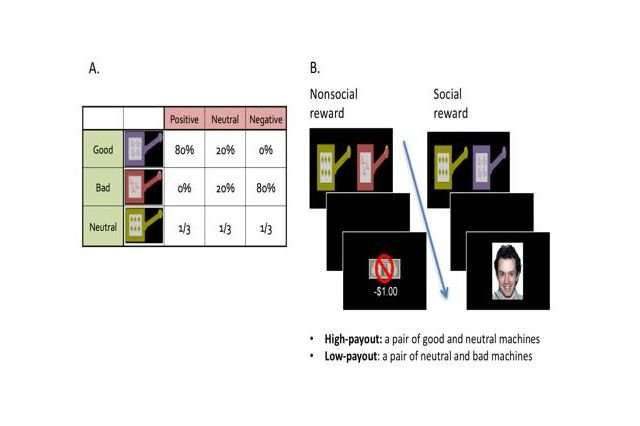Brains of people with schizophrenia are less reactive to social rewards like smiling faces, study shows

In imaging studies, UCLA researchers found that the brains of people with schizophrenia are less sensitive to social rewards, such as the positive feelings that can come from social interactions with people, than they are to so-called nonsocial rewards, such as money or objects.
People generally find social stimulation rewarding, which in turn motivates them to seek more social interactions. Conversely, in people with schizophrenia, abnormalities in how the brain processes social rewards likely contribute to human interaction problems. One of the hallmarks of schizophrenia is the impairment of social function, which includes the ability to conduct everyday conversations and maintain relationships with other people.
To study the brain's response to different stimuli, researchers recruited 27 people with clinically stable schizophrenia and 25 healthy individuals. They were asked to complete a task while in a functional magnetic resonance imaging, or fMRI, scanner. Functional MRI scans look at blood flow in the brain to detect areas of activity.
The task was to play a computerized version of a slot machine, or "one-armed bandit." There were two categories of payouts, images of dollar bills or of happy human faces. Researchers asked the participants to evaluate which machines had the best "payouts" in each category.
When comparing machines that gave dollar-bill payouts, levels of activity in the brain were similar in people with and without schizophrenia. However, when comparing machines that gave payouts of human smiling faces, the level of activity in the brain was much lower in people with schizophrenia than in healthy individuals.
The findings provide additional evidence of disrupted social rewards processing in people with schizophrenia, researchers say. The next project is to perform the test in patients who have experienced their first psychotic episode to see how their reactions to social rewards change.
The study appears in the September 5 issue of the journal Schizophrenia Bulletin.
More information: Junghee Lee et al. Reduced Neural Sensitivity to Social vs Nonsocial Reward in Schizophrenia, Schizophrenia Bulletin (2018). DOI: 10.1093/schbul/sby109

















